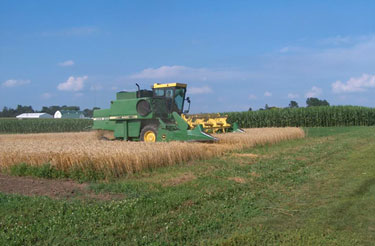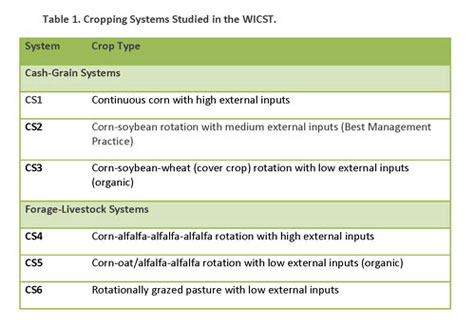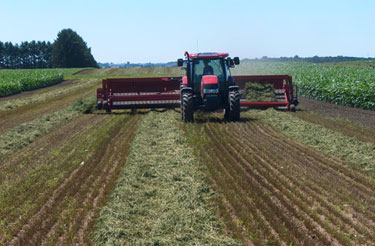USA
August 29, 2014

Harvesting winter wheat in the organic grain rotation (CS3) at the Wisconsin Integrated Cropping Systems Trial, Arlington, WI. Photo Credit: Janet Hedtcke
Long-term crop analysis provides valuable information on factors such as sustainability, yield, the effects of technology, and crop rotation. However, long-term trials, such as the Wisconsin Integrated Cropping Systems Trial (WICST), face significant challenges.
“Crop yield trends require data from a lengthy time interval, usually ten years or more. This is a problem because it’s difficult to maintain the funding, personnel, and facilities for such a long period,” says Jon Baldock, consultant at Baldock Statistical Services. Baldock, in collaboration with the University of Wisconsin department of agronomy, recently published the results of a statistical study in the Agronomy Journal. The study analyzed data from the WICST for crop yield trends—in particular, differences between conventional and organic farming.
“Another challenge,” says Baldock, “is that the technology in use at the start of the period has often been replaced by the end.” Therefore, researchers have to decide whether to use obsolete methods or update their methods but risk losing consistency.
Given these challenges, it is especially important to focus on study design long before the study begins. One of the key factors in designing the WICST, notes Baldock, was to compare philosophies of crop production, rather than specific treatments—like the amounts of fertilizer applied or the tillage equipment used. Doing so enabled the researchers to keep the technology used within each philosophy current.
The WICST studied six cropping systems: three cash-grain systems and three forage-livestock systems (Table 1). This study did not include CS6, because the methods of measuring the pasture weight gains were not consistent with the crop yields.

For the corn crops, “technology had a larger effect on yields than weather, climate, or agronomic factors,” says Baldock. In all systems, improving technology led to positive corn yield trends over the WICST time course. “Although some have predicted that genetic engineering technology would accelerate the growth in corn yields,” says Baldock, “we did not observe such an acceleration.”
The study showed that soybean crops in both conventional and organic systems produced the same overall yield trends. For corn and alfalfa, yields increased more rapidly in the conventional systems than in the organic systems. However, when there were significant improvements in the technology available for the organic systems, their yields nearly equaled those of the conventional systems. Baldock concludes, “The available technology was more important in determining the differences between conventional and organic system yields than agroecological effects.”

Merging windrows during the harvest of conventional alfalfa in CS4 at the Wisconsin Integrated Cropping Systems Trial, Arlington, WI. Photo Credit: Janet Hedtcke
Besides comparing organic and conventional agriculture, the study addressed the issue of sustainability. “This was a daunting task,” says Baldock, “because sustainability entails such a broad spectrum of issues that it is the equivalent of perfection.” The study looked at specific aspects of sustainability, including productivity and the environmental impact in terms of the nitrogen cycle. According to Baldock, the study found “advantages and disadvantages to each system. The integrated crop-livestock systems posed particular problems in nitrogen management.”
The study concluded that no blanket recommendation was possible for sustainability. Baldock says, “The selection of a cropping system should match their pros and cons to the needs of each farm and farmer.” He also notes that it is important to conduct additional long-term studies on various cropping systems. Such studies will provide further insight into the advantages and disadvantages, yield trends, sustainability, and technology for both organic and conventional cropping systems.